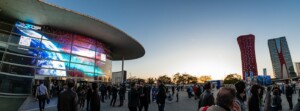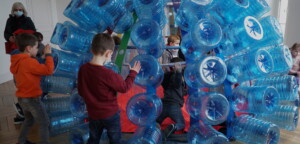ADG converts old Moscow cinemas in residential districts into retailtainment centres, highlighting the new move to hyperlocality in city regeneration.
Retail developer ADG Group is developing a network of 39 neighbourhood centres, mainly created from former cinemas purchased from Moscow authorities. It is repurposing them as local community centres and FECs. Each centre has a multiplex cinema as its central hub but expands the buildings’ original purpose by adding family entertainment and edutainment spaces, retail, F&B outlets and community facilities.
“Multifunctional centres cater to the needs of the local community,” says ADG in a release. “Neighbourhood centres are more than just a place to catch a movie, but also to take yoga lessons, cooking classes, art lectures, buy fresh fruit and vegetables and stop by an interactive store.”
ADG Group, a local retail developer, bought 30 old-style Soviet former cinemas from the Moscow authorities at the end of 2014 and the first of them was reopened as an FEC/community centre in 2019.
To date, seven have been opened, despite the pandemic, four are scheduled for Q1 2021 and IG reports that the remainder will open within the next year.
Regenerating the city via hyperlocality
The first centre, called Angara, opened in early 2019 on Chongarsky Boulevard.
“Traditional shopping centres will have to become public spaces that combine shopping and entertainment and attract families with children,” says ADG. Cinema draws people in and is the obvious hub for a wider offering however each project will vary, as ADG stresses the importance of hyperlocality: “Companies need to take into account all local trends, offering the most relevant products and services for each specific area.”
Personalized communication drives traffic
Generations Y and Z have shifted market rules for retail and entertainment centres and ADG’s centres revolve around a loyalty programme, based on big data analysis and personalised communication.
“Personalisation will be one of the key trends in retail,” says Grigoriy Pecherskiy, Managing Partner of ADG group. “Generation Z is ready to sacrifice privacy for convenience: people already expect that their next communication with a company will take into account the previous experience.”
Visitors will receive individual deals based on predictive analysis and ADG believes these will drive demand and motivated traffic to the centres.
Variety of partners
25 of the centres will include interactive Tele2 stores with VR zones alongside high-tech sales outlets. Meanwhile ADG is partnering with FEC specialists PandaPark to operate edutainment offerings in many of the centres. “Flexible multifunctional spaces with intelligent zoning” will satisfy the needs of all ages, from babysitting areas, through a playground featuring developmental games, to a gym, VR room, climbing wall and master classes for older children.
ADG Group was founded in 2004 with the express purpose of developing large regional centres in Russia. It now has more than a million square metres of projects in its portfolio, stretching across the country. “Our mission is to identify and meet the changing needs of urban citizens,” says ADG on its website. “The network of neighbourhood centres is aimed at driving new quality of life for 2.5 million Muscovites living nearby. The network will become Moscow’s biggest project on the commercial real estate market in terms of number of sites.”
The re-imagining of the High Street
As the move to online retail continues to decimate the traditional High Street, imaginative uses of existing buildings are key to city regeneration. Many retail centres are already being reimagined as entertainment centres or multi-use buildings. Flip Out recently created a new adventure play park ‘super-centre’ in a former BHS store in Aylesbury
“The high street is under siege like never before,” says James Child, retail analyst at Estate Gazette, in a report for Key Loans and Mortgages Limited. “However the high street isn’t dying – it is in a state of transition. Locals still need service-led offers.”
Focusing on local
As the ADG project shows, looking local will become a vital planning trend. In Paris a former barracks in the Minimes area has been restructured with buildings converted into public housing, offices and workshops. Facilities include a clinic, a day-care facility, a café, and a public garden. The project is part of a larger plan for the “15-minute city”. “At its heart is the concept of mixing urban social functions to create a vibrant vicinity,” says Carlos Moreno at University of Paris 1. The idea is that residents can meet all their needs within 15 minutes of their homes, bringing housing, retail, leisure and entertainment together.
The pandemic has highlighted the importance of local facilities and where Moscow and Paris lead, other cities are bound to follow.
Image: ADG Group














